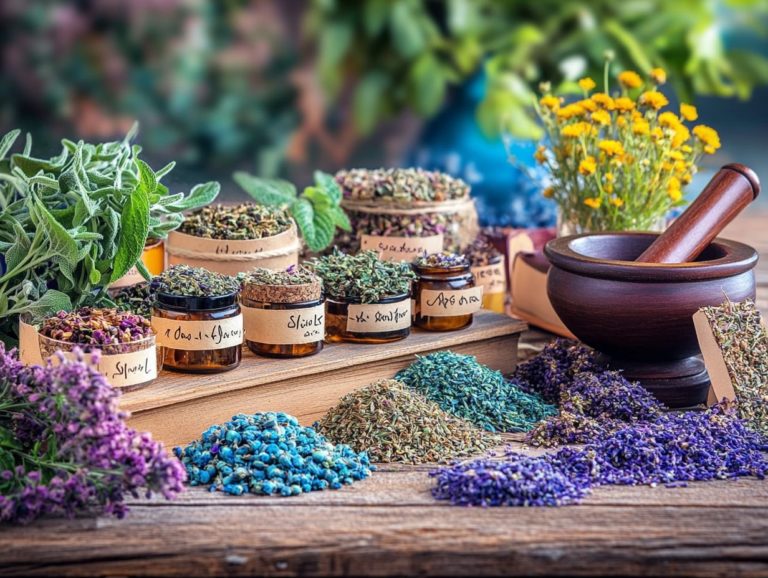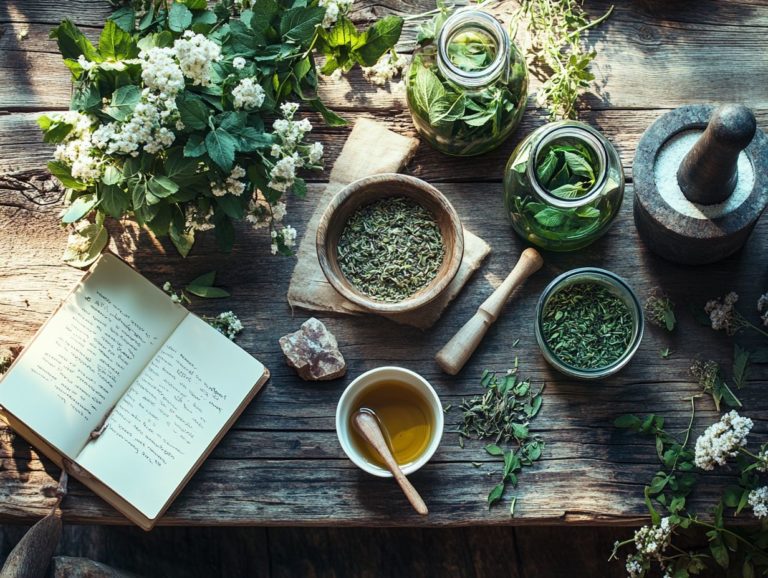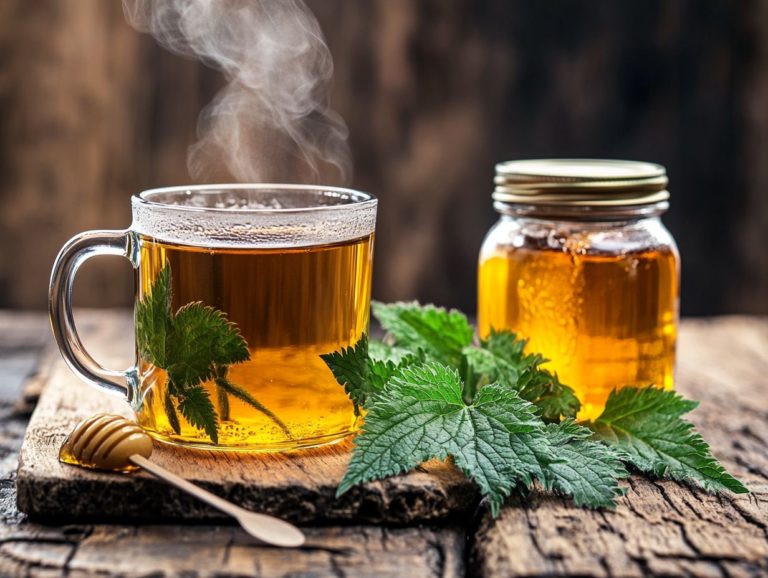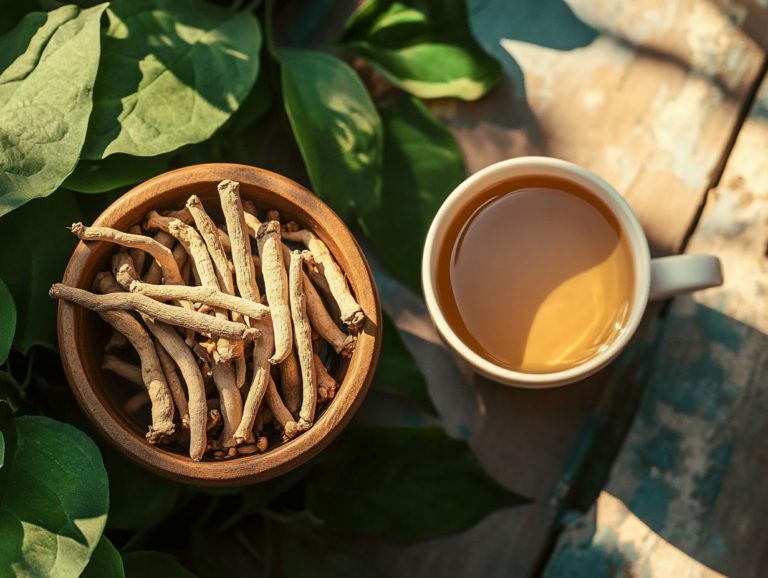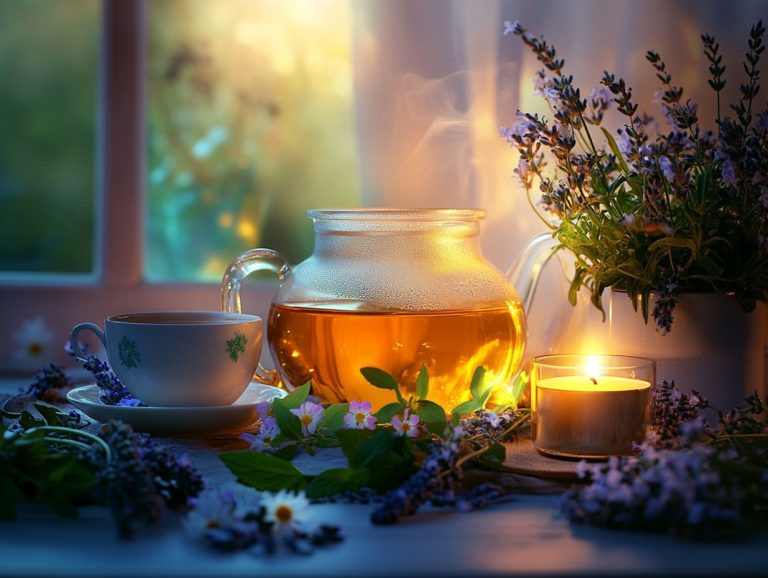5 Best Herbs for Mood Enhancement
Feeling a bit down or anxious? You re definitely not alone. Many individuals seek natural ways to elevate their mood, and herbs have been trusted allies for centuries in supporting emotional well-being.
Let s dive into five amazing herbs that can truly uplift your mood: St. John’s Wort, Ashwagandha, Rhodiola Rosea, Passionflower, and Lemon Balm. You ll learn how each herb works, any potential side effects, and the best ways to incorporate them into your routine. Plus, you ll discover whether they re safe to use alongside other medications.
Explore additional natural methods for enhancing your mood as well. Dive in to uncover how these herbal allies can be a vital part of your support system!
Contents
- Key Takeaways:
- 1. St. John’s Wort
- 2. Ashwagandha
- 3. Rhodiola Rosea
- 4. Passionflower
- 5. Lemon Balm
- How Do These Herbs Help with Mood Enhancement?
- Frequently Asked Questions
- What are the 5 best herbs for mood enhancement?
- How does St. John’s Wort help with mood enhancement?
- Can Rhodiola Rosea help with fatigue and low energy?
- What are the benefits of using Ashwagandha for mood enhancement?
- Is Passionflower safe to use for mood enhancement?
- How can Lemon Balm improve mood and mental well-being?
Key Takeaways:
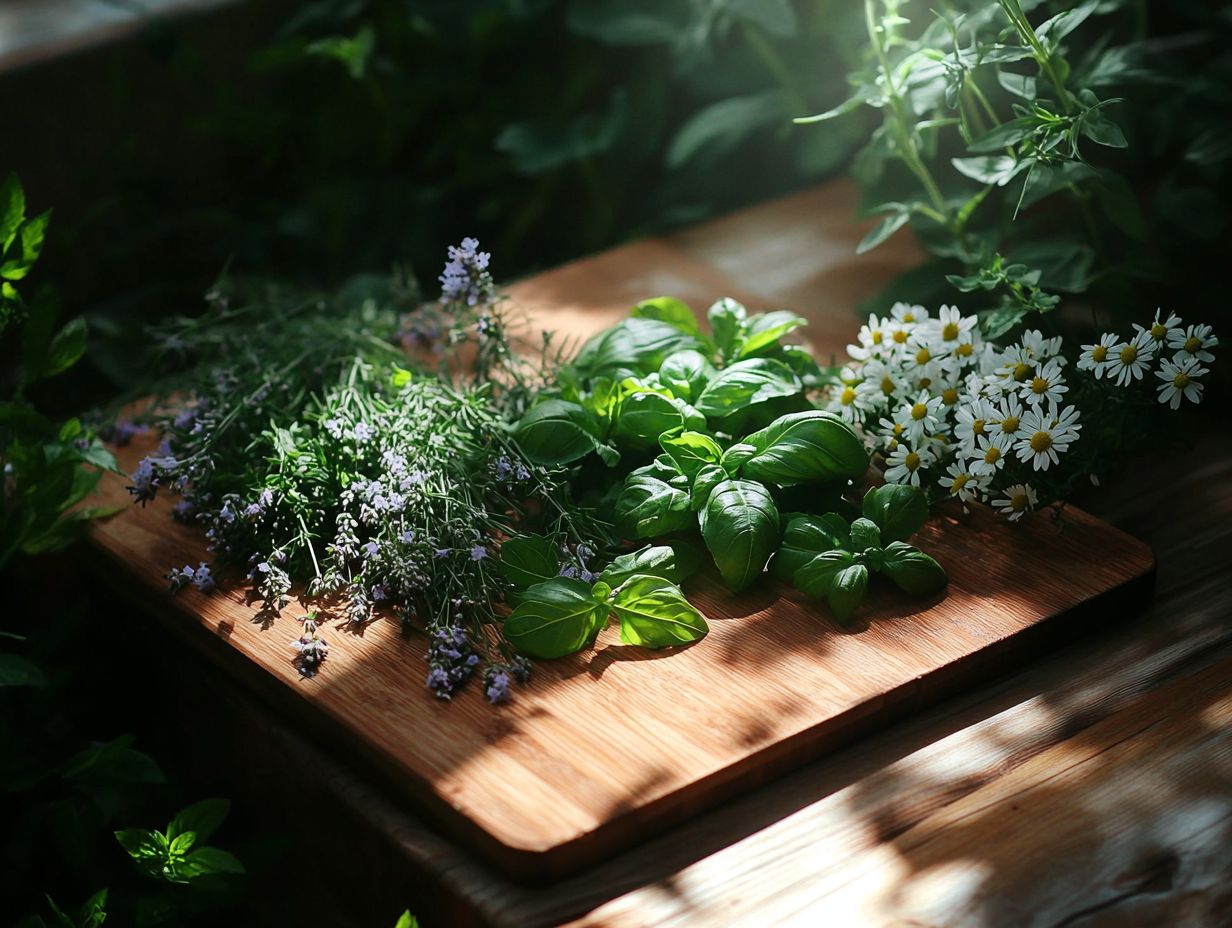
St. John’s Wort, Ashwagandha, Rhodiola Rosea, Passionflower, and Lemon Balm are among the 5 herbs for boosting mental focus that can help enhance mood.
These herbs help regulate neurotransmitters, reduce stress and anxiety, and promote relaxation and calm.
Consult a doctor before using these herbs, as they may interact with medications and have potential side effects.
1. St. John’s Wort
St. John’s Wort is a well-regarded herbal remedy renowned for its ability to alleviate mood issues, such as depression and anxiety disorders. This makes it a favored option for those seeking mood-enhancing alternatives without the side effects commonly associated with conventional antidepressants.
Derived from the plant Hypericum perforatum, this ancient herb has undergone numerous clinical trials, indicating its potential effectiveness in treating mild to moderate depression. It also serves as a natural support for emotional well-being and mental health.
The science behind its benefits primarily hinges on its active compounds, especially hypericin and hyperforin. These compounds are thought to play a significant role in influencing neurotransmitter activity within the brain. Research has demonstrated that they can inhibit the reuptake of serotonin, dopamine, and norepinephrine, leading to an improved mood.
Historically, St. John’s Wort has stood the test of time, with its use documented as far back as ancient Greece, where it was commonly applied to address emotional disturbances. While dosage recommendations can vary, a typical regimen usually falls between 300 to 900 mg of standardized extract per day.
Stay alert to potential interactions with other medications, as St. John’s Wort can diminish the effectiveness of certain drugs, including antiretrovirals and oral contraceptives. Consulting with a healthcare provider before incorporating this herb into your routine is not just wise; it’s necessary.
2. Ashwagandha
Ashwagandha, a herb that helps your body manage stress, is renowned for its remarkable ability to alleviate anxiety, making it an invaluable mood enhancer in the world of herbal supplements. Rooted in the rich traditions of Ayurvedic medicine, this herb has been cherished for ages for its role in promoting emotional well-being and stability.
Many users report a newfound sense of balance in their state of mind, thanks to its unique interactions with neurotransmitters like serotonin and dopamine. By potentially lowering cortisol levels often dubbed the stress hormone Ashwagandha can help ease feelings of anxiety and tension.
While it s generally considered safe, it’s wise to remain mindful of possible side effects, which can include digestive discomfort or drowsiness in some individuals.
Incorporating Ashwagandha into your daily routine may lead to significant enhancements in emotional health and fortify your resilience against the challenges life throws your way.
3. Rhodiola Rosea
Rhodiola Rosea is a powerful mood-enhancing herb renowned for its adaptogenic properties, helping you combat fatigue and elevate your mental health by balancing the neurotransmitters that regulate your mood.
Research suggests that this remarkable herb can significantly alleviate symptoms of mood disorders like depression and anxiety, providing a natural pathway to emotional well-being.
By supporting cognitive function, it sharpens your focus and concentration, giving you the power to tackle daily challenges with greater ease.
If you re considering integrating Rhodiola into your routine, it’s versatile enough to be taken as a supplement or blended into your morning smoothies or teas for an energizing boost.
Studies have shown that consistent use can enhance your resilience against stress and foster a more balanced emotional state, making it an invaluable addition to your holistic self-care regimen.
4. Passionflower

Passionflower is a fantastic herbal supplement known for its calming effects. It s especially effective for managing anxiety and emotional stress.
This plant has a rich history in traditional medicine. Its ability to promote relaxation comes from its influence on the nervous system.
Passionflower works by modulating a brain chemical called GABA. This helps reduce excitability in the brain, leading to a feeling of peace.
You can enjoy passionflower in teas, tinctures, or capsules. This range of options caters to your preference for natural mood enhancers.
When compared to familiar herbs like valerian root or chamomile, passionflower stands out with its unique calming properties.
5. Lemon Balm
Lemon Balm is another soothing herb to consider. It s often enjoyed as herbal tea.
This delightful herb can reduce anxiety and boost your mood. It s a great addition to holistic practices.
Lemon Balm also enhances sleep quality. If you struggle with insomnia, this could be a game changer.
To prepare it, steep fresh or dried leaves in hot water for about 10 minutes. This will bring out the flavor and benefits.
If you opt for a supplement, the typical dosage is between 300 to 500 mg. Always consult a healthcare provider about interactions with other supplements.
How Do These Herbs Help with Mood Enhancement?
Herbs like St. John’s Wort and Ashwagandha can significantly improve your mood. They work by influencing neurotransmitters that affect your emotional well-being.
These remedies are supported by scientific research, confirming their effectiveness. For instance, St. John’s Wort helps modulate serotonin levels, similar to how some antidepressants work.
Ashwagandha, on the other hand, can lower cortisol levels, reducing stress and anxiety. This combination offers a holistic approach to emotional wellness.
What Are the Possible Side Effects of Using These Herbs?
While herbs like St. John’s Wort and Ashwagandha offer benefits, be aware of potential side effects. These may include mild issues like digestive problems or fatigue.
More serious reactions can occur, such as allergic responses or interactions with medications. For example, St. John’s Wort may reduce the effectiveness of certain antidepressants and birth control pills.
Ashwagandha could worsen symptoms in people with thyroid conditions. Therefore, it s crucial to consult a healthcare professional before adding these herbs to your routine.
This ensures safe usage and minimizes risks, leading to a more effective mood-enhancing experience tailored for you.
How Can These Herbs Be Incorporated into One’s Routine?
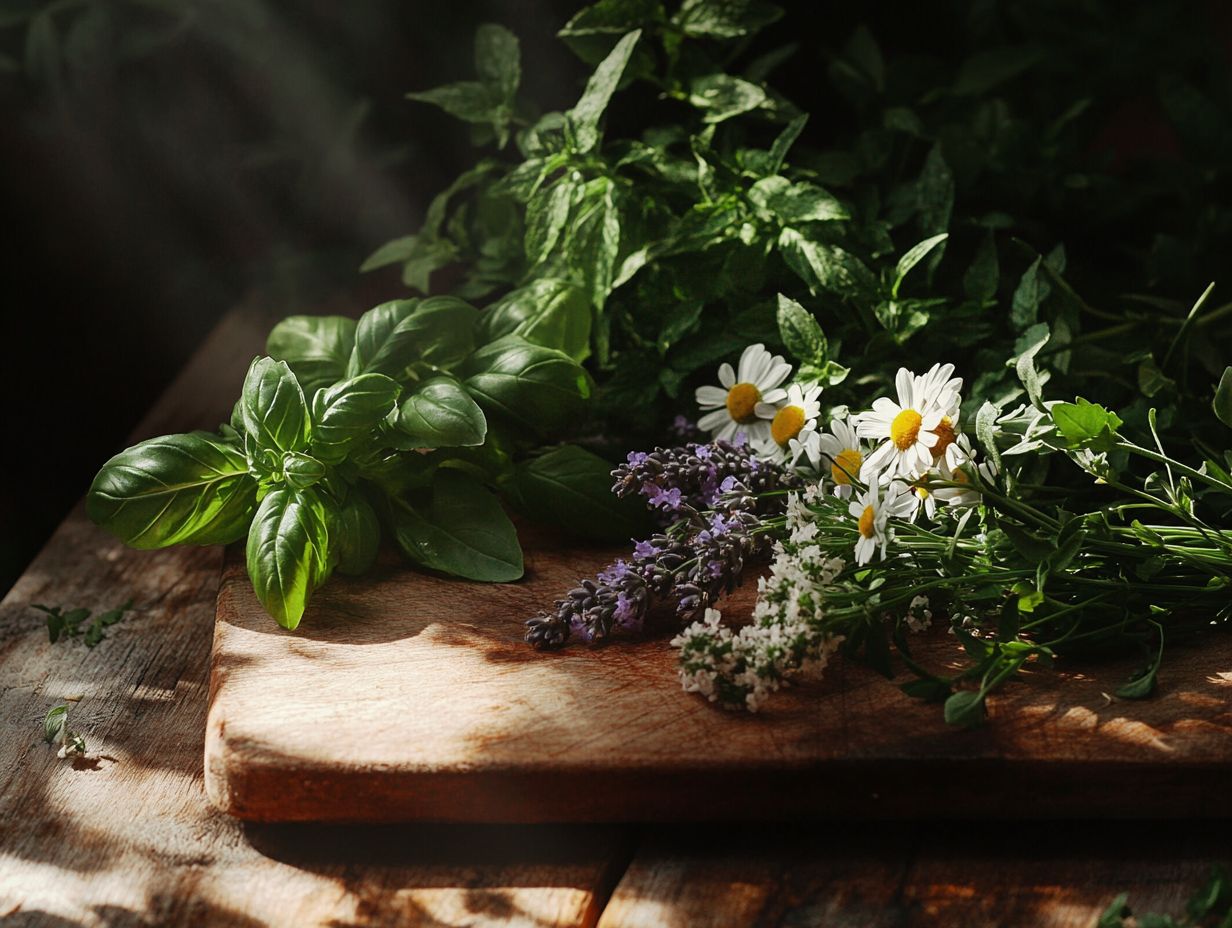
Incorporating herbs like St. John’s Wort and Ashwagandha into your daily routine can be effortless. Pairing them with good nutrition and regular exercise can truly enhance your mood.
To fully harness the benefits of these powerful herbs, consider adding them into your daily life in simple ways. For instance, brewing a soothing tea with St. John’s Wort can become a calming evening ritual, providing both enjoyment and relaxation. On the other hand, Ashwagandha in capsule form offers a convenient solution for your busy mornings.
The right timing matters; it’s often best to take Ashwagandha in the morning for that energy boost, while St. John’s Wort is typically recommended for the evening or as needed. Dosage can vary, so consulting with a healthcare professional helps ensure safe and effective use.
And don t forget to adopt a holistic approach a complete way of looking at health that includes body, mind, and lifestyle. Combine these herbs with a balanced diet, mindfulness practices, and plenty of restful sleep for optimal mental health.
Are These Herbs Safe to Use with Other Medications?
The safety of using herbs like St. John’s Wort alongside other medications, particularly antidepressants, is a paramount consideration that warrants a discussion with your healthcare professionals.
As you explore herbal treatments, it’s vital to recognize that certain herbs can interact negatively with prescription medications. These interactions can potentially diminish their effectiveness or lead to adverse effects. Consulting with your healthcare provider ensures they are fully informed about all the medications you are taking, which is essential for effective treatment planning.
Understanding these interactions can help you avoid unwanted side effects, such as increased anxiety or mood fluctuations. Your health professionals can offer invaluable guidance on appropriate dosages, alternative remedies, and monitoring for any potential complications, ultimately creating a safer path to wellness for you.
How Long Does It Take to See Results from Using These Herbs?
The timeline for seeing results from herbs like Rhodiola Rosea and Passionflower can differ quite a bit depending on individual factors, and there s been a fair amount of clinical research focused on mood enhancement.
Typically, you might notice improvements within a few weeks of consistent use, but this duration can vary based on several elements. For example, the dosage you choose is significant some might find that higher doses speed up results, while others may benefit more from lower amounts.
Consistency is paramount; regular intake is essential for maximizing those benefits. Your unique lifestyle also plays a role. Stress levels, diet, and physical activity can influence how effective these herbs are for you, underscoring the importance of a personalized approach.
What Are Some Other Natural Methods for Improving Mood?
Besides exploring herbal supplements, you can enhance your mood through various natural methods. Regular exercise, nutritious eating, and adding mood-boosting nutrients like omega-3 fatty acids and vitamin D to your diet are essential for nurturing your mental well-being.
Mindfulness practices, such as meditation and deep breathing, can help you cultivate a sense of calm and awareness, effectively reducing stress and anxiety. A balanced diet, brimming with fruits, vegetables, and whole grains, not only fuels your body but also positively influences your mood and cognitive function.
Engaging in enjoyable physical activities stimulates the release of endorphins, providing a natural lift to your spirits. By combining these holistic approaches, you can create a powerful synergy that enhances your overall mental health.
Frequently Asked Questions
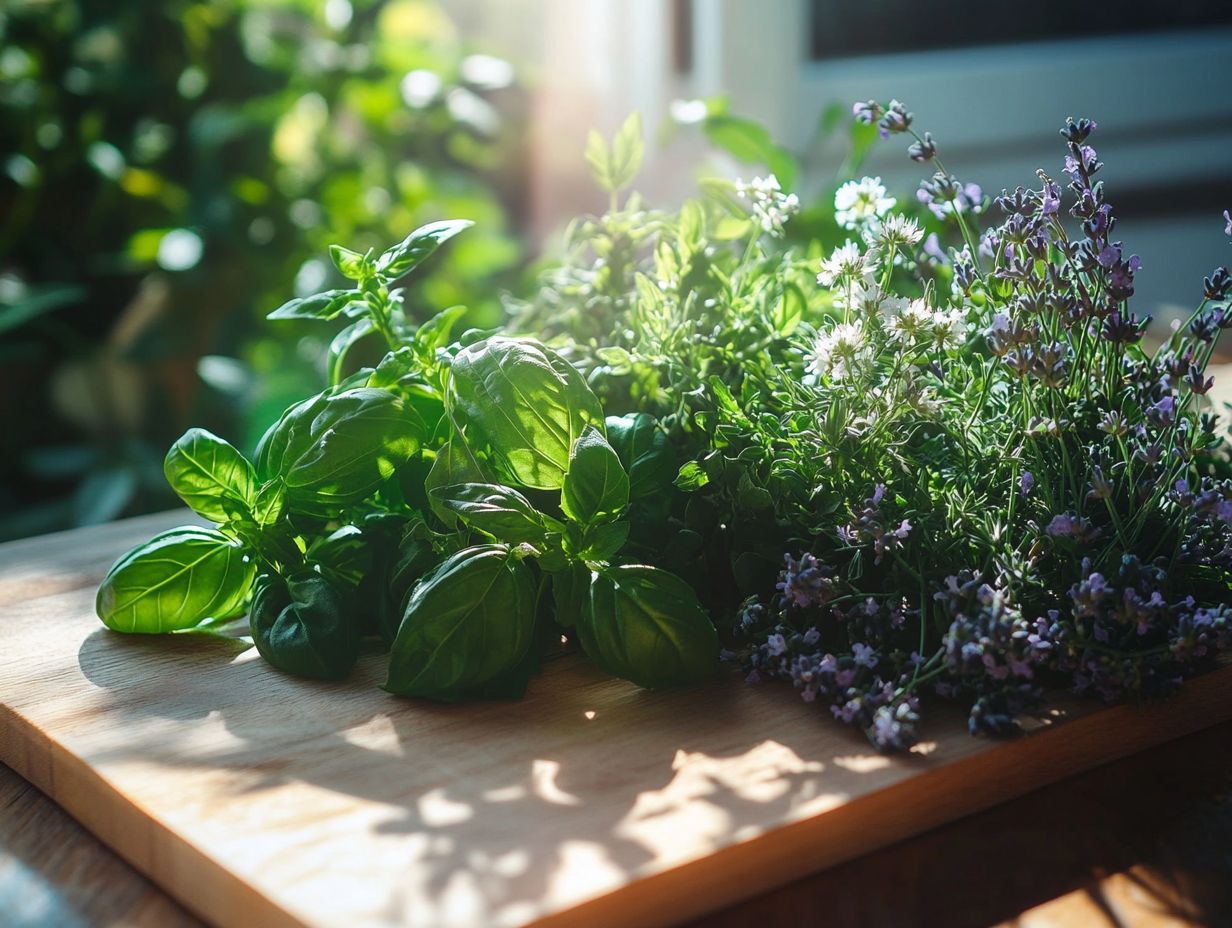
What are the 5 best herbs for mood enhancement?
The 5 best herbs for mood enhancement are St. John’s Wort, Rhodiola Rosea, Ashwagandha, Passionflower, and Lemon Balm.
How does St. John’s Wort help with mood enhancement?
St. John’s Wort has been used for centuries to improve mood and reduce symptoms of depression, anxiety, and seasonal affective disorder. It works by increasing levels of serotonin, dopamine, and norepinephrine in the brain, which are important neurotransmitters for regulating mood.
Can Rhodiola Rosea help with fatigue and low energy?
Yes, Rhodiola Rosea boosts both mental and physical energy. It s a fantastic herb for lifting your mood and reducing stress.
What are the benefits of using Ashwagandha for mood enhancement?
Ashwagandha, known as Indian ginseng, has been a staple in Ayurvedic medicine for thousands of years. It helps lower stress, brighten your mood, and promote relaxation.
Is Passionflower safe to use for mood enhancement?
Passionflower is generally safe for mood enhancement. It supports calmness and relaxation, making it ideal for those dealing with anxiety or insomnia.
However, it may interact with some medications. Always consult with a healthcare professional before use.
How can Lemon Balm improve mood and mental well-being?
Lemon Balm is known for its calming and uplifting effects. It helps reduce anxiety and improve sleep quality.
This herb also boosts cognitive function and contains substances that protect the brain from damage.

